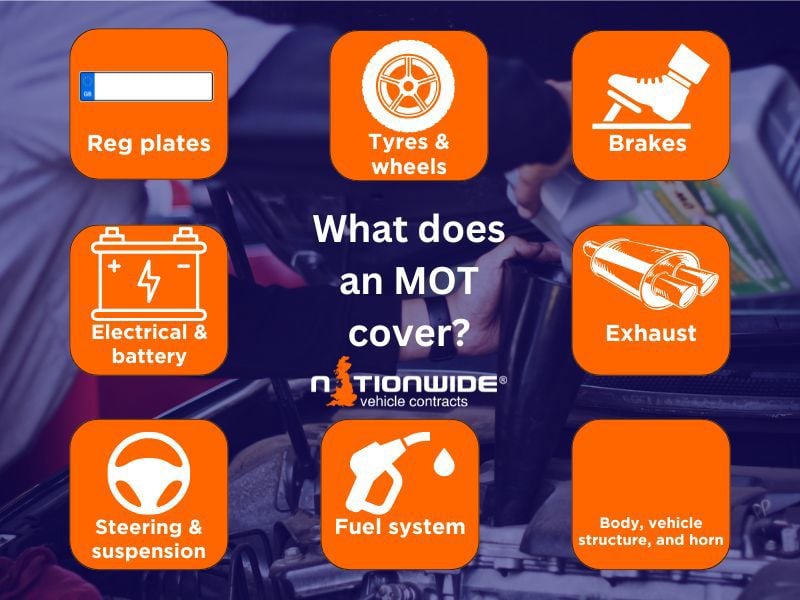
Driving your own car comes with a variety of responsibilities, and one of the most crucial is ensuring it passes its annual MOT test.
MOTs seem to have this air of mystery surrounding them, and I’m sure every driver will have experienced some stress or anxiety at some point in the lead up to their MOT.
However, this doesn’t have to be the case. MOTs are a relatively simple process, and understanding their ins and outs can save you a lot of time, money, and effort.
In this blog, we’ll cover everything you need to know, from what an MOT is to how to prepare for one and what it covers.
We discuss:
An MOT, which stands for Ministry of Transport test, is an annual inspection required for every car that’s over three years old in the UK.
It ensures your car meets road safety and environmental standards. Essentially, whether it is road legal or not.
Without a valid MOT, your car is unfit to be on the roads, as it is deemed to put you and other road users at risk. If caught driving without an MOT, you can be fined up to £1,000 (gov.uk).
Knowing when your car’s MOT is vital to not only ensuring you stay compliant with UK road law but also ensuring your car is fit to drive on the road.
The best way to check is by using the government’s MOT checker. All you’ll need is your car’s number plate.
If you’re driving a brand-new car, your first MOT is due three years after the point of registration. After these initial three years, an MOT must then be completed every 12 months.
Therefore, if you’ve leased a new car on a 24-month contract, you don’t even have to worry about an MOT. If you’re on a 36 or 48-month contract, you must MOT your car three years from its registration point.
If you’ve taken out a used car lease deal with Nationwide Vehicle Contracts, it will come with a minimum of six months MOT (after this, it’s your responsibility).
Preparation is key to avoiding stress relating to your MOT. Here are some quick checks to carry out before your MOT appointment:
- Lights and indicators - Ensure all lights, including headlights, brake lights, and indicators, are working.
- Tyres - Check the tread depth of the tyres and look for any visible damage, like cuts or bulges.
- Wipers - Test your windscreen wipers and make sure the washer fluid is topped up.
- Horn - You might not think it, but your horn needs to work to pass your MOT. Give it a quick press to ensure it’s working.
- Number plates - Clean both your front and rear plates and check for any surface damage or cracks.
- Fluid levels - Ensure your oil, brake fluid, and engine coolant are at the recommended levels.
An MOT typically takes around an hour to complete and is essentially a thorough inspection of your vehicle’s safety features. The key areas assessed include:
- Brakes - Checks the condition, any modifications, and any anti-lock braking/electronic stability control systems.
- Exhaust system - Check if it’s secure, a catalyst isn’t missing, and without serious leaks.
- Body, vehicle structure, and horn - Check if the car is free from excessive corrosion and has no sharp edges and if the horn is working properly.
- Fuel system - Checks that there are no leaks, the pipes and hoses are in good condition, and fuel caps fasten securely.
- Steering and suspension - Checks they’re working correctly, any inappropriate repairs or modifications, and the steering lock mechanisms are working properly.
- Electrical wiring and battery - Checks visible electrical wiring and the battery.
- Registration plates - Checks if they’re in good condition, secure, in colour, and the characters are correctly formed and spaced.
- Tyres and wheels - Checks for condition, security, tyre size and type, and tread depth.

If your car fails its MOT, the first thing you should do is not panic! Although you might be thinking about the associated cost with this, it’s actually a good thing. You now know exactly what is wrong with your car.
You get a couple of options when you fail. You can appeal the result if you think it’s wrong, but you can also drive your car if no ‘dangerous’ problems are listed in the MOT.
However, this is the process we’d recommend:
- Address the faults with a trusted garage
- If the repairs are completed within 10 working days at the same testing centre, you may quality for a free partial retest
Want to avoid the stress of an MOT? A maintenance contract with your lease deal is a brilliant option.
An MOT test is included in your maintenance contract; all you need to do is simply ring your finance provider and book your vehicle. Yes, it really is that simple!
For more information about our maintenance contracts, check out our Vehicle Maintenance page.
An MOT and servicing are similar in principle but serve different purposes. An MOT ensures your car meets legal safety and environmental standards, while servicing is a more comprehensive check that focuses on maintaining your car’s overall health.
While an MOT is mandatory, regular servicing is optional but highly recommended to prevent expensive repairs and improve your car’s lifespan. It’s recommended that you service your car once a year or every 12,000 miles, whichever comes first.
If you want to kill two birds with one stone, our maintenance contracts include both MOT and servicing!
For more information regarding servicing, check out our guide, Servicing Your Lease Car.
Keeping on top of your MOT doesn’t have to be stressful. By understanding the process and performing simple checks beforehand, you’re already setting yourself up for success and ensuring cash stays in your pocket.
Think of your MOT as an opportunity to ensure your car is safe and roadworthy, providing you peace of mind while driving.
Remember, don’t wait until the last minute to sort out your MOT. Book it in early to secure a convenient slot and avoid unnecessary hassle.
Looking for more information on car maintenance? Check out our range of maintenance guides, such as Top Tips to Care for Your Lease Vehicle and Tips on Keeping Your Vehicle Secure.
We are also one of the UK’s largest car leasing brokers, offering a range of deals to suit your every need. For more information, call us on 0345 811 9595 or check out our latest leasing deals.

